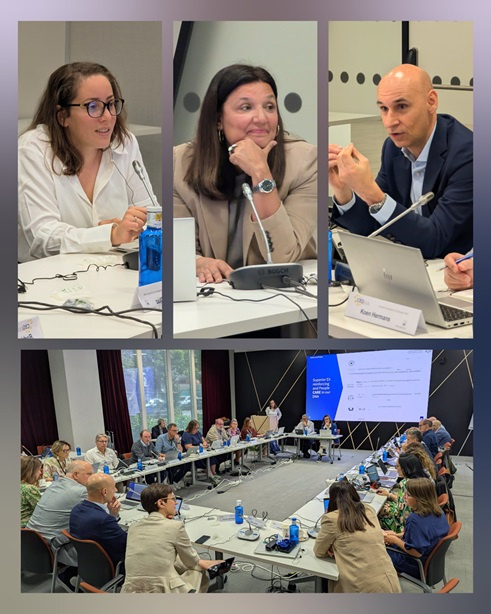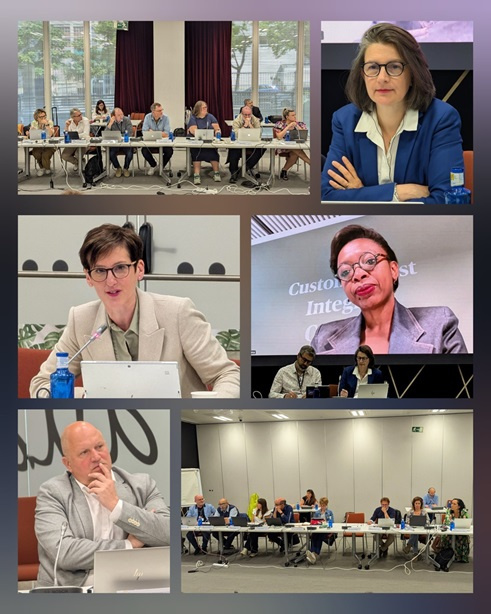Bureau of May 2025
04.07.2025
Koen Hermans is looking forward to meeting with elected representatives in Madrid to prepare for the next plenary meeting. The aim is to gain a better understanding of the Spanish market, AXA's position in it, and the challenges and opportunities for the Group.
The second part of this session, with Karima Silvent, Group Head of Human Resources Director, and Kirsty Liervers, Group Head of Culture, Inclusion and Diversity, is devoted to the new direction the Group wishes to take with its smart working policy. Koen Hermans emphasises the importance of adopting a responsible approach for all stakeholders in order to preserve the Group's flexibility and competitiveness as an employer, while maintaining its culture, which is a differentiating asset in the market.
Presentation of AXA Seguros España and its HR strategy
Spain's GDP growth is higher than that of other European countries, while inflation is lower. Leila Miri, Head of Management Control and Finance AXA Seguros España, says that the Spanish economy is healthy, with good growth prospects. However, insurance penetration is significantly lower than in other countries, creating growth potential and opportunities for AXA Spain in a market estimated at €75 billion, two-thirds of which is for property and casualty insurance and one-third for life insurance. Distribution is evenly split between agents, brokers and bancassurance, with AXA Spain working mainly with agents and brokers, generating 10% of its sales directly. AXA Spain's portfolio consists of 50% personal insurance, 30% health insurance and 20% commercial insurance, with the latter market dominated by SMEs at 89%.
AXA Spain has made significant progress since 2017, rising from 9th to 5th place in the market. The ambition is to reach 4th place and become the leading non-Spanish insurer. This development is based on a network of very powerful agents, acquisitions such as GACME, a distribution agreement signed with CORREOS, and technical excellence. The NPS has also improved significantly.
Rodrigo Fuentes Gomez, HR Director AXA Seguros España, emphasises that Spain is a land of opportunity for the Group and expresses his pride in seeing AXA invest there. He acknowledges that the entity's results could not have been achieved without the employees who make the plan possible. Transparent communication, the involvement of trade unions in discussions and the development of employee skills are key factors for success. AXA Spain is built on three pillars: culture, employee capabilities and the Care & Dare strategy.
The focus is on simplifying processes to improve the employee experience, even if this sometimes involves periods of difficult change. An ‘agile’ working method is being introduced to encourage collective contribution, while the development of AI is improving the experience and productivity.
AXA Spain's slogan is ‘at AXA, you can be yourself’. Despite turbulence in some countries, AXA continues to focus on diversity and inclusion, particularly in terms of gender equality. AXA Spain ranks third among the ‘top employers’. Teresa de Vega Diaz, Head of Employee Relations, Compensation & Benefits and Health & Safety, mentions that there is a strong culture of internal mobility, with more than half of vacancies in 2024 filled internally. The company also wants to develop the leadership of its employees in a spirit of One AXA. The integration of GACME is continuing, with an agreement reached between management and employee representatives to support this process and harmonise the different statuses.
Smartworking Follow-Up
Koen Hermans said that the aim of this session was to share the management's vision, which is moving towards a three-day-a-week presence on site. Management wants to involve employee representatives in a constructive and transparent exchange. He emphasised the importance of maintaining AXA's flexibility and competitiveness while preserving its culture and DNA.
Kirsty Leivers emphasises that a corporate culture is built gradually. Soft skills account for half of the skills required in a company and are acquired through contact with other members of the team, particularly for new arrivals. She notes that, at the same time, human contact is likely to diminish with the increasing use of technology, and that some employees feel isolated.
Kirsty Leivers explains that the fundamental principle of the project remains flexibility: sharing time between home and the office (home office, other company sites, meetings with customers, training, etc.). The three days of attendance per week should be understood as an individual average, with some variation from week to week. This approach requires improvements in terms of available workspace and its use. Expectations will need to be clearly defined, and it will be important to optimise the time spent together on site.
Management is nevertheless aware that implementation will take time.
Pascale Rauline, Secretary of the EWC, reiterates that it is important to take the time to find the right balance between the expectations of the group and those of employees through constructive social dialogue, in order to achieve a win-win situation, focusing on incentives and giving meaning to the collective. These discussions must also take place as close as possible to the reality on the ground in the countries and entities concerned.
You will find the not of the secretariat:

